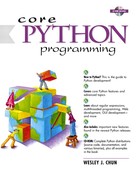2.11. if Statement
The standard if conditional statement follows this syntax:
if expression: if_suite
If the expression is non-zero or true, then the statement suite is executed; otherwise, execution continues on the first statement after. “Suite” is the term used in Python to refer to a sub-block of code and can consist of single or multiple statements.
>>> if counter > 5: … print 'stopping after 5 iterations' … break
Python supports an else statement that is used with if in the following manner:
if expression: if_suite else: else_suite
Python has an “else-if” statement named elif which has the following syntax:
if expression1: if_suite elif expression2: elif_suite else: else_suite
Another surprise: There is no switch or case statement in Python. This may also seem strange and/or detracting at first, but a set of if-elif-else statements are not as “ugly” because of Python's clean syntax. If you really want to circumvent a set of chained if-elif-else statements, another elegant workaround is using a for loop (see below) to iterate through your list of possible “cases.”
You can learn more about if, elif, and else statements in the conditional section of Chapter 8.
